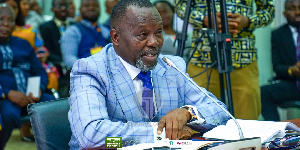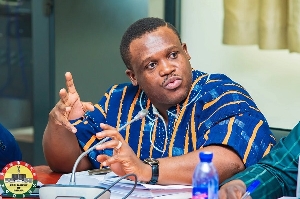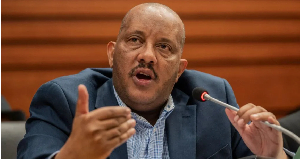Ishmael Mensah Blog of Tuesday, 14 January 2025
Source: Ishmael Mensah
Ayine dislikes important parts of the criminal offenses bill and is against its return.

Dr. Dominic Ayine, Attorney General and Minister-designate of Justice, has expressed his disapproval of the Criminal and Other Offenses (Procedure) Amendment Bill's possible reappearance.
An amendment to the Criminal and Other Offences (Procedure) Act, 1960 (Act 30), proposed by Godfred Yeboah Dame, the then-Attorney General and Minister of Justice, was approved by Parliament on June 27, 2022. Plea bargaining was formally introduced into Ghana's legal system for the first time with this legislation.
Dr. Ayine challenged the bill's basic logic during his screening by Parliament's Appointments Committee on Monday, January 13, but he pledged to carefully examine its provisions to guarantee their efficacy and justice.
“If the Hon. Member [Patrick Boamah] is seeking to know from me whether, in terms of the scope and substantive content of that bill, it will be introduced as it was, my answer is no. I disagree fundamentally with some of its logic,” Dr. Ayine stated.
"The whole idea that preliminary applications are being used to delay conclusions of trials—I disagree fundamentally," he said, challenging the notion that preliminary applications needlessly postpone trials. Lawyers shouldn't be restricted, in my opinion.
Lawyers should submit as many applications as they can if judges have missed any technical concerns. Dr. Ayine underlined that in order for substantive trials to take place, the judiciary must manage these applications effectively. He maintained that "the judiciary has an obligation to expeditiously dispose of those [applications] so that the substantive trial can proceed."
"Some of these applications are fundamental in terms of trying to do right by the law and procedure under Act 30," he said, further denouncing attempts to use laws to prevent attorneys from submitting early applications.
I therefore strongly disagree with it. "If it should ever be tabled at all, or if the status quo remains, I will take a look at it," Dr. Ayine continued, promising to critically reevaluate the law. However, I have serious problems with it.
BACKGROUND
In order to formally integrate plea bargaining into Ghana's justice system for the first time, the Attorney-General and Minister for Justice, Mr. Godfred Yeboah Dame, sponsored a Bill to amend the Criminal and Other Offences (Procedure Act), 1960 (Act 30), which was passed by Parliament on June 27, 2022.
Plea bargaining will be allowed in all instances by this alteration to the Criminal Procedure Act, with the exception of a handful that are specified in the Bill that Parliament passed.
Plea bargaining is a criminal justice procedure that is practiced in various jurisdictions when an accused person gives up their right to a full trial in return for another advantage.
According to the Attorney General's explanation to Parliament prior to the Bill's second reading earlier this year in March, the State benefits from plea bargaining by avoiding lengthy and drawn-out trials, which saves time and money, and by reducing the number of cases the courts and prosecutors must handle.
Other factors include reducing sentencing, which helps the accused rehabilitate, and providing victims of offenses with restitution and compensation in addition to the accused's penalty, which relieves prison overcrowding.
Before becoming law, the bill must have the president's consent.














